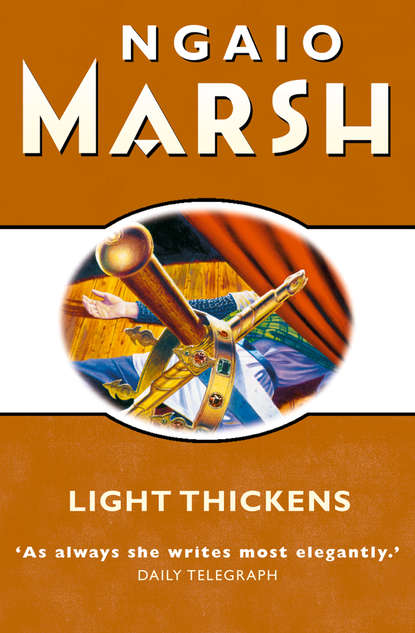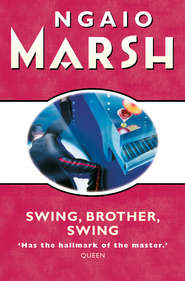По всем вопросам обращайтесь на: info@litportal.ru
(©) 2003-2024.
✖
Light Thickens
Автор
Год написания книги
2019
Настройки чтения
Размер шрифта
Высота строк
Поля
‘Entirely evil,’ answered the relieved Peregrine. ‘Dressed like fantastic parodies of Meg Merrilies but with terrible faces. We don’t see their faces until “look not like the inhabitants of the earth and yet are on’t,” when they are suddenly revealed. They smell abominably.’
‘And speak?’
‘Braid Scots.’
‘What about me, Perry? Braid Scots too?’ suggested the porter.
‘Yes. You enter through the central trap, having been collecting fuel in the basement. And,’ Peregrine said with ill-concealed pride, ‘the fuel is bleached driftwood and most improperly shaped. You address each piece in turn as a farmer, as an equivocator and as an English tailor, and you consign them all to the fire.’
‘I’m a funny man?’
‘We hope so.’
‘Aye. A-weel, it’s a fine idea, I’ll give it that. Och, aye. A bonny notion,’ said the porter.
He chuckled and mouthed and Peregrine wished he wouldn’t, but he was a good Scots actor.
He waited for a moment, wondering how much he had gained of their confidence. Then he turned to the designs and explained how they would work and then to the costumes.
‘I’d like to say here and now that these drawings and those for the sets – Jeremy has done both – are, to my mind, exactly right. Notice the suggestion of the clan tartans: a sort of primitive pre-tartan. The cloak is a distinctive check affair. All Macbeth’s servitors and servitors of royal personages wore their badges and the livery of their masters. Lennox, Angus and Ross wear their own distinctive cloaks with the clan check. Banquo and Fleance have particularly brilliant ones, blood-red with black and silver borders. For the rest, thonged trousers, fur jerkins, and sheepswool chaps. Massive jewellery. Great jewelled bosses, heavy necklets and heavy bracelets, in Macbeth’s case reaching up to the elbow and above it. The general effect is heavy, primitive but incidentally extremely sexy. Gauntlets, fringed and ornamented. And the crowns! Macbeth’s in particular. Huge and heavy it must look.’
‘Look,’ said Macdougal, ‘being the operative word, I hope.’
‘Yes, of course. We’ll have it made of plastic. And Maggie…do you like what you see, darling?’
What she saw was a skin-tight gown of dull metallic material, slit up one side to allow her to walk. A crimson, heavily furred garment was worn over it, open down the front. She had only one jewel, a great clasp.
‘I hope I’ll fit it,’ said Maggie.
‘You’ll do that,’ he said, ‘and now – ‘ he was conscious of a tightness under his belt – ‘we’ll clear stage and get down to business. Oh! There’s one point I’ve missed. You will see that for our first week some of the rehearsals are at night. This is to accommodate Sir Dougal who is shooting the finals of his new film. The theatre is dark, the current production being on tour. It’s a bit out of the ordinary, I know, and I hope nobody finds it too awkward?’
There was a silence during which Sir Dougal with spread arms mimed a helpless apology.
‘I can’t forbear saying it’s very inconvenient,’ said Banquo.
‘Are you filming?’
‘Not precisely. But it might arise.’
‘We’ll hope it doesn’t,’ Peregrine said. ‘Right? Good. Clear stage, please, everybody. Scene 1. The witches.’
II
‘It’s going very smoothly,’ said Peregrine, three days later. ‘Almost too smoothly. Dougal’s uncannily lamblike and everyone told me he was a Frankenstein’s Monster to work with.’
‘Keep your fingers crossed,’ said his wife, Emily. ‘It’s early days yet.’
‘True.’ He looked curiously at her. ‘I’ve never asked you,’ he said.
‘Do you believe in it? The superstition business?’
‘No,’ she said quickly.
‘Not the least tiny bit? Really?’
Emily looked steadily at him. ‘Truly?’ she asked.
‘Yes.’
‘My mother was a one hundred per cent Highlander.’
‘So?’
‘So it’s not easy to give you a direct answer. Some superstitions – most, I think – are silly little matters of habit: a pinch of spilt salt over the left shoulder. One may do it without thinking but if one doesn’t it’s no great matter – that sort of thing. But – there are other ones. Not silly. I don’t believe in them, but I think I avoid them.’
‘Like the Macbeth ones?’
‘Yes. But I didn’t mind you doing it. Or not enough to try to stop you. Because I don’t really believe,’ said Emily very firmly.
‘I don’t believe at all. Not at any level. I’ve done two productions of the play and they both were accident-free and very successful. As for the instances they drag up – Macbeth’s sword breaking and a bit of it hitting someone in the audience or a dropped weight narrowly missing an actor’s head – if they’d happened in any other play nobody would have said it was an unlucky play. How about Rex Harrison’s hairpiece being caught in a chandelier and whisked up into the flies? Nobody said My Fair Lady was unlucky.’
‘Nobody dared to mention it, I should think.’
‘There is that, of course,’ Peregrine agreed.
‘All the same, it’s not a fair example.’
‘Why isn’t it?’
‘Well, it’s not serious. I mean, well…’
‘You wouldn’t say that if you’d been there, I dare say,’ said Peregrine.
He walked over to the window and looked at the Thames: at the punctual late-afternoon traffic. It congealed on the south bank, piled up, broke out into a viscous stream and crossed by bridge to the north bank. Above it, caught by the sun, shone the theatre: not very big but conspicuous in its whiteness and, because of the squat mess of little riverside buildings that surrounded it, appearing tall, even majestic.
‘You can tell which of them’s bothered about the bad luck stories,’ he said. ‘They won’t say his name. They talk about “the Thane” and “the Scots play” and “the Lady”. It’s catching. Lady Macduff – Nina Gaythorne, silly little ass – is steeped up to the eyebrows in it. And talks about it. Stops if she sees I’m about but she does all right, and they listen to her.’
‘Don’t let it worry you, darling. It’s not affecting their work, is it?’ Emily asked.
‘No.’
‘Well, then.’
‘I know. I know.’
Emily joined him and they both looked out over the Thames to where the Dolphin shone so brightly. She took his arm. ‘It’s easy to say, I know,’ she said, ‘but if you could just not. Don’t brood. It’s not like you. Tell me how the great Scot is making out as Macbeth.’
‘Fine. Fine.’











